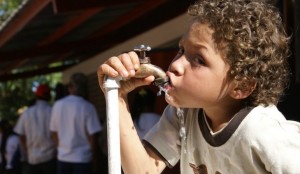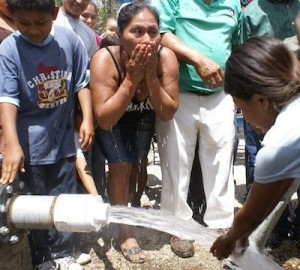World Bank gives $30M for water project
Report by: Nicaragua Dispatch
 In celebration of World Water Day, the World Bank today announced a new $30 million project to bring potable water and sewage services to 85 rural municipalities in Nicaragua.
In celebration of World Water Day, the World Bank today announced a new $30 million project to bring potable water and sewage services to 85 rural municipalities in Nicaragua.
The sustainable water project, funded by $14.3 million in World Bank loans and $15.7 million in grants, will provide basic water and sewage service to 52,000 Nicaraguans over the next five years.
In Nicaragua, only 68% of the rural population has access to drinking water, and only 37% have access to sewage treatment, according to the World Bank. The government claims the percentage of those with access to drinking water in the urban households is slightly higher — around 84%. But in a country of daily water rationing in many poor neighborhoods, government statistics on access to drinking water are notoriously unreliable (in 2007, Ruth Selma Herrera, then-head of the state-owned Nicaraguan Water and Sewage Company, had to adjust the official statistics from 90% coverage to around 70% coverage after discovering just how inflated the government numbers were).
Maura Madriz Paladino, director of the water program for the Alexander von Humboldt Center, a non-governmental organization specializing in environmental issues, told The Nicaragua Dispatch last year that her organization surveyed Nicaraguan homes in 2011 and found that 80% of Nicaragua’s population doesn’t receive the quantity or quality of water it needs—a situation she qualified as “alarming.”
“We can’t determine who has access to drinking water by looking at the number of people who have plumbing in their homes, but in Managua a lone there are lots of homes that have pipes in the walls but no water in the pipes,” Madriz said. “We need to talk about the percentage of people who actually have potable water available to them in the quantity and quality to satisfy their basic needs.”
lone there are lots of homes that have pipes in the walls but no water in the pipes,” Madriz said. “We need to talk about the percentage of people who actually have potable water available to them in the quantity and quality to satisfy their basic needs.”
Says Herrera, the problem in Nicaragua is not the amount of water, but the quality.
“We are a country rich in contaminated water resources,” she said this morning in an interview on a local radio station Café con Voz.